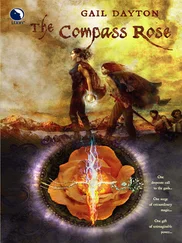Ursula Le Guin - The Compass Rose
Здесь есть возможность читать онлайн «Ursula Le Guin - The Compass Rose» весь текст электронной книги совершенно бесплатно (целиком полную версию без сокращений). В некоторых случаях можно слушать аудио, скачать через торрент в формате fb2 и присутствует краткое содержание. Жанр: Фантастика и фэнтези, на английском языке. Описание произведения, (предисловие) а так же отзывы посетителей доступны на портале библиотеки ЛибКат.
- Название:The Compass Rose
- Автор:
- Жанр:
- Год:неизвестен
- ISBN:нет данных
- Рейтинг книги:3 / 5. Голосов: 1
-
Избранное:Добавить в избранное
- Отзывы:
-
Ваша оценка:
- 60
- 1
- 2
- 3
- 4
- 5
The Compass Rose: краткое содержание, описание и аннотация
Предлагаем к чтению аннотацию, описание, краткое содержание или предисловие (зависит от того, что написал сам автор книги «The Compass Rose»). Если вы не нашли необходимую информацию о книге — напишите в комментариях, мы постараемся отыскать её.
From dream worlds to nightmare planets, through mazes of madness to tiny time holes in space, down Pathways of Desire to a New Atlantis, THE COMPASS ROSE points the way to the wonder-filled mind-country of a remarkable writer.
"As good as any contemporary at creating worlds, imaginary or our own… Le Guin writes with painstaking intelligence. Her characters are complex and haunting, and her writing is remarkable for it's sinewy grace."
—TIME Magazine
The Compass Rose — читать онлайн бесплатно полную книгу (весь текст) целиком
Ниже представлен текст книги, разбитый по страницам. Система сохранения места последней прочитанной страницы, позволяет с удобством читать онлайн бесплатно книгу «The Compass Rose», без необходимости каждый раз заново искать на чём Вы остановились. Поставьте закладку, и сможете в любой момент перейти на страницу, на которой закончили чтение.
Интервал:
Закладка:
To Berta and Eva, however, it was more than that. They were its chief architect-designers, its most ingenious builder-excavators, and its most diligent and contented occupants, forever inventing an improvement in ventilation, or learning how to make skylights, or revealing to us a new addition to our suite of rooms, dug in the living ice. It was thanks to them that our stores were stowed so handily, that our stove drew and heated so efficiently, and that Buenos Aires, where nine people cooked, ate, worked, conversed, argued, grumbled, painted, played the guitar and banjo, and kept the Expedition’s library of books and maps, was a marvel of comfort and convenience. We lived there in real amity; and if you simply had to be alone for a while, you crawled into your sleeping hole head first.
Berta went a little farther. When she had done all she could to make South South America livable, she dugout one more cell just under the ice surface, leaving a nearly transparent sheet of ice like a greenhouse roof; and there, alone, she worked at sculptures. They were beautiful forms, some like a blending of the reclining human figure with the subtle curves and volumes of the Weddell seal, others like the fantastic shapes of ice cornices and ice caves. Perhaps they are there still, under the snow, in the bubble in the Great Barrier. There where she made them they might last as long as stone. But she could not bring them north. That is the penalty for carving in water.
Captain Pardo was reluctant to leave us, but his orders did not permit him to hang about the Ross Sea indefinitely, and so at last, with many earnest injunctions to us to stay put—make no journeys—take no risks—beware of frostbite—don’t use edge tools—look out for cracks in the ice—and a heartfelt promise to return to Orca Bay on the twentieth of February, or as near that date as wind and ice would permit, the good man bade us farewell, and his crew shouted us a great goodbye cheer as they weighed anchor. That evening, in the long orange twilight of October, we saw the topmast of the Yelcho go down the north horizon, over the edge of the world, leaving us to ice, and silence, and the Pole.
That night we began to plan the Southern Journey.
The ensuing month passed in short practice trips and depot-laying. The life we had led at home, though in its own way strenuous, had not fitted any of us for the kind of strain met with in sledge-hauling at ten or twenty degrees below freezing. We all needed as much working-out as possible before we dared undertake a long haul.
My longest exploratory trip, made with Dolores and Carlota, was southwest towards Mount Markham, and it was a nightmare—blizzards and pressure ice all the way out, crevasses and no view of the mountains when we got there, and white weather and sastrugi all the way back. The trip was useful, however, in that we could begin to estimate our capacities; and also in that we had started out with a very heavy load of provisions, which we depoted at 100 and 130 miles SSW of Base. Thereafter other parties pushed on farther, till we had a line of snow cairns and depots right down to Latitude 83° 43', where Juana and Zoe, on an exploring trip, had found a kind of stone gateway opening on a great glacier leading south. We established these depots to avoid, if possible, the hunger that had bedevilled Captain Scott’s Southern Party, and the consequent misery and weakness. And we also established to our own satisfaction—intense satisfaction—that we were sledgehaulers at least as good as Captain Scott’s husky dogs. Of course we could not have expected to pull as much or as fast as his men. That we did so was because we were favored by much better weather than Captain Scott’s party ever met on the Barrier; and also the quantity and quality of our food made a very considerable difference. I am sure that the fifteen percent of dried fruits in our pemmican helped prevent scurvy; and the potatoes, frozen and dried according to an ancient Andean Indian method, were very nourishing yet very light and compact—perfect sledging rations. In any case, it was with considerable confidence in our capacities that we made ready at last for the Southern Journey.
The Southern Party consisted of two sledge teams: Juana, Dolores, and myself; Carlota, Pepita, and Zoe. The support team of Berta, Eva, and Teresa set out before us with a heavy load of supplies, going right up onto the glacier to prospect routes and leave depots of supplies for our return journey. We followed five days behind them, and met them returning between Depot Ercilla and Depot Miranda (see map). That “night”—of course there was no real darkness—we were all nine together in the heart of the level plain of ice. It was the fifteenth of November, Dolores’s birthday. We celebrated by putting eight ounces of pisco in the hot chocolate, and became very merry. We sang. It is strange now to remember how thin our voices sounded in that great silence. It was overcast, white weather, without shadows and without visible horizon or any feature to break the level; there was nothing to see at all. We had come to that white place on the map, that void, and there we flew and sang like sparrows.
After sleep and a good breakfast the Base Party continued north, and the Southern Party sledged on. The sky cleared presently. High up, thin clouds passed over very rapidly from southwest to northeast, but down on the Barrier it was calm and just cold enough, five or ten degrees below freezing, to give a firm surface for hauling.
On the level ice we never pulled less than eleven miles, seventeen kilometers, a day, and generally fifteen or sixteen miles, twenty-five kilometers. (Our instruments, being British made, were calibrated in feet, miles, degrees Fahrenheit, etc., but we often converted miles to kilometers because the larger numbers sounded more encouraging. ) At the time we left South America, we knew only that Mr. Shackleton had mounted another expedition to the Antarctic in 1908, had tried to attain the Pole but failed, and had returned to England in June of the current year, 1909. No coherent report of his explorations had yet reached South America when we left; we did not know what route he had gone, or how far he had got. But we were not altogether taken by surprise when, far across the featureless white plain, tiny beneath the mountain peaks and the strange silent flight of the rainbow-fringed cloud wisps, we saw a fluttering dot of black. We turned west from our course to visit it: a snow heap nearly buried by the winter’s storms—a flag on a bamboo pole, a mere shred of threadbare cloth—an empty oilcan—and a few footprints standing some inches above the ice. In some conditions of weather the snow compressed under one’s weight remains when the surrounding soft snow melts or is scoured away by the wind; and so these reversed footprints had been left standing all these months, like rows of cobbler’s lasts—a queer sight.
We met no other such traces on our way. In general I believe our course was somewhat east of Mr. Shackleton’s. Juana, our surveyor, had trained herself well and was faithful and methodical in her sightings and readings, but our equipment was minimal—a theodolite on tripod legs, a sextant with artificial horizon, two compasses, and chronometers. We had only the wheel meter on the sledge to give distance actually travelled.
In any case, it was the day after passing Mr. Shackleton’s waymark that I first saw clearly the great glacier among the mountains to the southwest, which was to give us a pathway from the sea level of the Barrier up to the altiplano, ten thousand feet above. The approach was magnificent: a gateway formed by immense vertical domes and pillars of rode. Zoe and Juana had called the vast ice river that flowed through that gateway the Florence Nightingale Glacier, wishing to honor the British, who had been the inspiration and guide of our expedition; that very brave and very peculiar lady seemed to represent so much that is best, and strangest, in the island race. On maps, of course, this glacier bears the name Mr. Shackleton gave it, the Beardmore.
Читать дальшеИнтервал:
Закладка:
Похожие книги на «The Compass Rose»
Представляем Вашему вниманию похожие книги на «The Compass Rose» списком для выбора. Мы отобрали схожую по названию и смыслу литературу в надежде предоставить читателям больше вариантов отыскать новые, интересные, ещё непрочитанные произведения.
Обсуждение, отзывы о книге «The Compass Rose» и просто собственные мнения читателей. Оставьте ваши комментарии, напишите, что Вы думаете о произведении, его смысле или главных героях. Укажите что конкретно понравилось, а что нет, и почему Вы так считаете.




